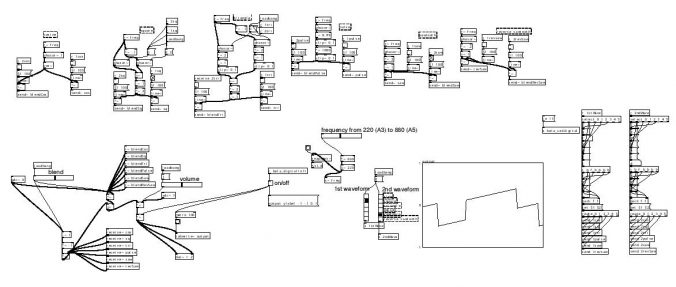The focus of our research is on the topics of foxhole radios & analog/digital synthesizer interfacing and their role(s) as technological marginalia. These technologies take advantage of significant scientific discoveries – such as radio, signal generation, and processing – and use them, there is no better word to describe it, for fun.
Our preliminary research shows that although foxhole radios had the potential to be tactically momentous in times of war or duress, not a single instance of “useful” foxhole (or penny-diode) radios has been documented. Similarly, synthesizers and further electronic music instruments were often born from the surplus of war-era research. The influence of this research being either literal (the EMS prototypes were assembled using leftover bomber parts that were bought secondhand in Ladbroke Grove, London) or somewhat indirect (military funding was one of the drivers of miniaturization that in turn led to the development of transistors and integrated circuits, the maturation of modular synthesizers, and, surprisingly, hearing aids – see Mills, 2010).
Aware of the sociocultural implications detailed by Sterne and Rodgers (2011), this project uses the premise of a fairly practical design challenge to ask (yet again, some might add) how a utilitarian project can be grounds for the expression of social ideals. In short, we are designing an arbitrary waveform generator in a way which can allow for the control of a hardware eurorack modular synthesizer from any Open Sound Control (OSC) capable networked device. Our prototype uses a Beaglebone, a Bela cape, C++ code, and some Pure Data patches. However, the specifics of these technical systems are less important than our recognition that they all come with some cultural and ideological baggage that prescribe the way in which we deal with their affordances and constraints. If artifacts have politics (Winner, 1988), how can artistic uses of “non-essential” systems play with these politics in a productive way?
It is important to note that we are not starting our research from scratch. Kirsten Haring’s 2006 book on the technoculture of Ham radio – amateur systems that also emerged from the surplus of WWII research – could be called a retroactive analysis of the macro effects of gender, class, and race-dependent technological developments of “non-(or less-)essential” systems. Haring’s book makes it quite clear that although the ARRL – the organization connecting amateur radio operators – eventually came to hold political weight, the origins of the practice built its somewhat significant and longlasting power as an aggregate of anecdotal, parallel, and personal developments – combining to form more than the sum of its parts. Rodgers’ more recent article Cultivating Activist Lives In Sound echoes Haring’s aforementioned point(s) as well, offering a list of possible angles from which sound can be a valuable starting point for activism. Rodgers goes on to state:
” a sonic activist might endeavor to do a small action in support of most or all of the above aspirations each day. For me, this list is a useful compass and practical guide, so that I can routinely ask myself: In what ways does my music-making today address X? How does my research further Y? If I’m not doing enough to support Z, what needs to change? It reveals how there can indeed be many approaches to cultivating an activist life in sound— many areas toward which we can direct our efforts—resulting in a proliferation of sonic-political acts that have local and far-reaching ripple effects..” (p.82)
We are not lying to ourselves about the revolutionary potential of our arbitrary function generators. We do see it as a way to elucidate other arbitrary or under-documented decisions in signal synthesis, processing and analysis (there is no political history of square wave, even though it is basically the building block of all modern communication and includes a number of standards which can be implemented in an even wider number of ways – all of which carry material significance and consequences), but that in itself is not necessarily the only motivation behind our process. Rather, I hope this project can serve as a template within sound studies and music technology for how to take devices which seem agnostic or apolitical, and show how developing them with institutional support is inherently political and should include everyday concerns of those politics. There are not many precedents for that in sound, and very few have been written about (see Rodgers, Pink Noises, 2010).
Ezra Teboul is HASS fellow in RPI’s tactical humanities laboratory researching the music implicit in circuits and code.


